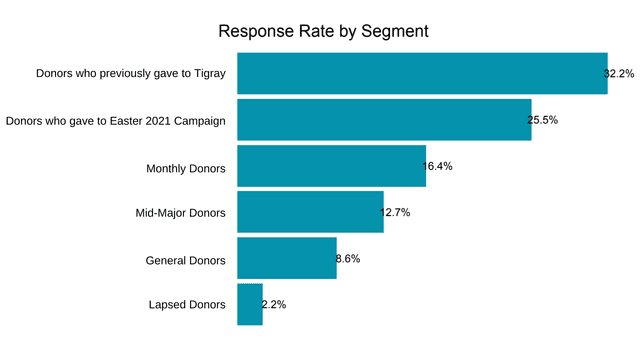Mennonite Central Committee Canada: Tigray, Ethiopia crisis appeal
- Exhibited by
- BuildGood
- Added
- June 29, 2022
- Medium of Communication
- Direct mail, email, online landing page
- Target Audience
- Faith-based
- Type of Charity
- International development
- Country of Origin
- Canada
- Date of first appearance
- April 2022
SOFII’s view
Talk about the fundamentals of fundraising done well! When the Mennonite Central Committee (MCC) Canada wanted to do something to help refugees of the Tigray crisis in Ethiopia, they were faced with a conundrum: they’d only just finished an appeal for victims of the war in Ukraine. Would donors be willing to give again so soon? And would they give to a cause that they felt less connected to (many of MCC’s donors have ties to Ukraine)? But by being bold and innovative, MCC exceeded all expectations, making the Tigray appeal their most successful Easter campaign to date.
Summary / objectives
To raise money for the lesser-known, but escalating crisis in Ethiopia’s Tigray region, from a donor base who had just donated millions to the emergency response in Ukraine.
Creator / originator
Strategy: BuildGood and Brad Quiring from MCC Canada
Copy: Becky Longhurst, BuildGood
Design: Carly Funk, BuildGood
Background
MCC Canada was founded over 100 years ago to help refugees escape famine in Ukraine. Many of the organisation’s donors and their family histories have roots in the Ukraine.
MCC has since become one of Canada’s most trusted international development organisations, working in more than 50 countries in the areas of relief, development, and peace.
When the war in Ukraine broke out in early 2022, the organisation launched an emergency response that raised millions of dollars in a short amount of time – from a donor base whose origin story is deeply tied to Ukraine.
But at the same time, the ongoing crisis in Ethiopia’s Tigray region was escalating.
And MCC was responding there, too.
Would donors – who had just stepped up in an extraordinary way for the people in Ukraine – be willing to help out again so soon? Had their giving for the year been mostly directed to Ukraine?
And would a lesser-known crisis be a compelling story for donors whose gifts to Ukraine were so personally meaningful?
The team at MCC worked with Canadian fundraising agency BuildGood to create a direct mail and email campaign that would stand out just a bit in mailboxes, and hopefully capture the imagination and hearts of generous donors who had already stepped up many times before in the face of conflict and war.
The result was MCC’s most successful Easter campaign to date, simply by focusing on doing the fundamentals of fundraising well.
Special characteristics
To make the transition from the Ukraine campaign to the Ethiopia appeal, a gratitude and update email on the emergency response in Ukraine went out to all donors a few weeks before the Ethiopia appeal to close the loop on the previous fundraising campaign to help children and families fleeing the war.
A primer email went out to all donors a few days before receiving the Ethiopia appeal in the mail, acknowledging the ongoing Ukraine war and pivoting to the crisis in Tigray. MCC Canada knew from prior surveys and testing that donors strongly identified with helping out in crises that aren’t making headlines anymore.
While a lot of conventional wisdom is to keep fundraising emails short and to the point, the main ‘ask’ email was a plain-text email from each provincial executive director close to 700 words long. Donors received two more follow-up emails from MCC about the ongoing situation in Tigray.
For the direct mail appeal, to break the pattern of traditional direct mail appeals, the letter was sent out in an oversized craft envelope designed to look like an air mail envelope. While this treatment is usually reserved for high value donors, the organisation agreed to try out the bigger pack for all donors on the final mailing list of 27,500 donors.
While MCC’s response in Tigray includes everything from food to shelter to long-term development, the offer of the appeal focused specifically on helping families who fled the conflict zone build palm mat shelters in the desert.
To help donors visualise the offer of providing palm mat shelters to people who are taking refuge in the desert, the lift note was made to look like an IKEA instruction manual. It made a serious offer a bit more fun, showed how creative and hard-working the families in Tigray are, and showed the impact of a donor’s gift.
The direct mail appeal reply device included a short donor satisfaction survey – the first attempt of the organisation to start measuring their donors’ experience. The same survey was also triggered on the post-donation page for donors who made an online gift.
Both the direct mail appeal and the email campaign pointed donors toward a dedicated campaign landing page – including one for higher value donors.
Following the campaign, donors were sent a thank you video from Ethiopia, with the palm mat shelters in the background. See video below.
Results
The campaign ended up being MCC’s most successful Easter campaign to date.
The direct mail and email campaign raised a combined total of CA$732,925. MCC’s fundraising team also used parts of the campaign to reach out to middle and major donors, resulting in an additional CA$102,986 for a total campaign total of CA$835,911.
- With total costs for the campaign being CA$56,000, the net income was CA$779,911.
- 41 per cent increase in gross revenue over the previous year campaign
- 11 per cent increase in response rate over the previous year campaign
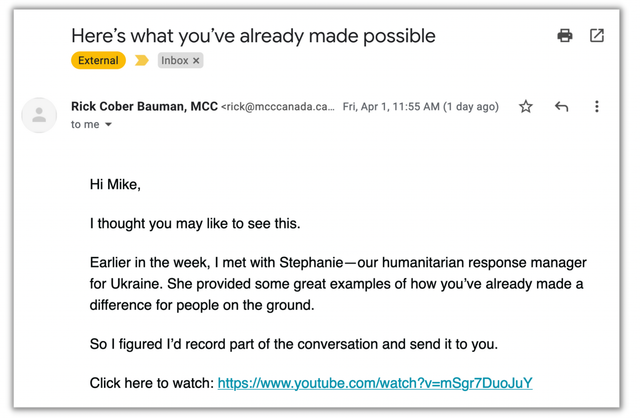 View original image
View original image
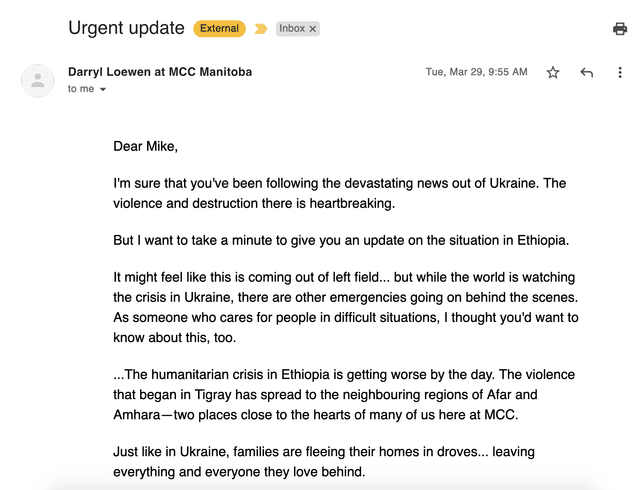 View original image
View original image
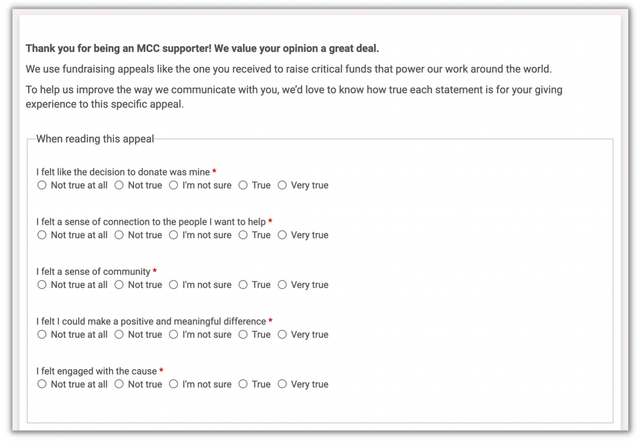 View original image
View original image
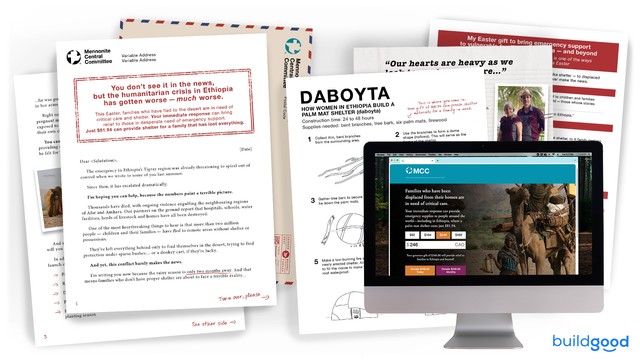 View original image
View original image
